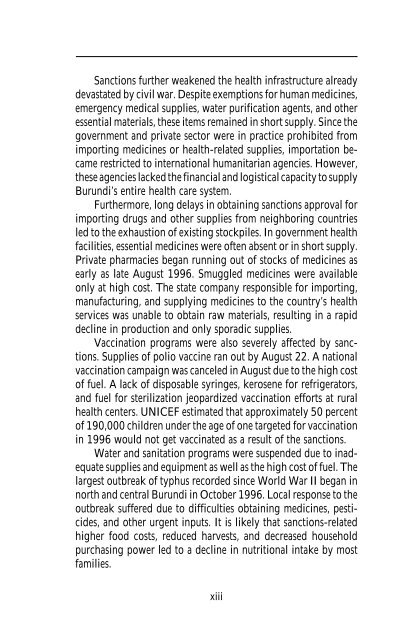The humanitarian impacts of economic sanctions on Burundi
The humanitarian impacts of economic sanctions on Burundi
The humanitarian impacts of economic sanctions on Burundi
Create successful ePaper yourself
Turn your PDF publications into a flip-book with our unique Google optimized e-Paper software.
Sancti<strong>on</strong>s further weakened the health infrastructure already<br />
devastated by civil war. Despite exempti<strong>on</strong>s for human medicines,<br />
emergency medical supplies, water purificati<strong>on</strong> agents, and other<br />
essential materials, these items remained in short supply. Since the<br />
government and private sector were in practice prohibited from<br />
importing medicines or health-related supplies, importati<strong>on</strong> became<br />
restricted to internati<strong>on</strong>al <str<strong>on</strong>g>humanitarian</str<strong>on</strong>g> agencies. However,<br />
these agencies lacked the financial and logistical capacity to supply<br />
<strong>Burundi</strong>’s entire health care system.<br />
Furthermore, l<strong>on</strong>g delays in obtaining <str<strong>on</strong>g>sancti<strong>on</strong>s</str<strong>on</strong>g> approval for<br />
importing drugs and other supplies from neighboring countries<br />
led to the exhausti<strong>on</strong> <str<strong>on</strong>g>of</str<strong>on</strong>g> existing stockpiles. In government health<br />
facilities, essential medicines were <str<strong>on</strong>g>of</str<strong>on</strong>g>ten absent or in short supply.<br />
Private pharmacies began running out <str<strong>on</strong>g>of</str<strong>on</strong>g> stocks <str<strong>on</strong>g>of</str<strong>on</strong>g> medicines as<br />
early as late August 1996. Smuggled medicines were available<br />
<strong>on</strong>ly at high cost. <str<strong>on</strong>g>The</str<strong>on</strong>g> state company resp<strong>on</strong>sible for importing,<br />
manufacturing, and supplying medicines to the country’s health<br />
services was unable to obtain raw materials, resulting in a rapid<br />
decline in producti<strong>on</strong> and <strong>on</strong>ly sporadic supplies.<br />
Vaccinati<strong>on</strong> programs were also severely affected by <str<strong>on</strong>g>sancti<strong>on</strong>s</str<strong>on</strong>g>.<br />
Supplies <str<strong>on</strong>g>of</str<strong>on</strong>g> polio vaccine ran out by August 22. A nati<strong>on</strong>al<br />
vaccinati<strong>on</strong> campaign was canceled in August due to the high cost<br />
<str<strong>on</strong>g>of</str<strong>on</strong>g> fuel. A lack <str<strong>on</strong>g>of</str<strong>on</strong>g> disposable syringes, kerosene for refrigerators,<br />
and fuel for sterilizati<strong>on</strong> jeopardized vaccinati<strong>on</strong> efforts at rural<br />
health centers. UNICEF estimated that approximately 50 percent<br />
<str<strong>on</strong>g>of</str<strong>on</strong>g> 190,000 children under the age <str<strong>on</strong>g>of</str<strong>on</strong>g> <strong>on</strong>e targeted for vaccinati<strong>on</strong><br />
in 1996 would not get vaccinated as a result <str<strong>on</strong>g>of</str<strong>on</strong>g> the <str<strong>on</strong>g>sancti<strong>on</strong>s</str<strong>on</strong>g>.<br />
Water and sanitati<strong>on</strong> programs were suspended due to inadequate<br />
supplies and equipment as well as the high cost <str<strong>on</strong>g>of</str<strong>on</strong>g> fuel. <str<strong>on</strong>g>The</str<strong>on</strong>g><br />
largest outbreak <str<strong>on</strong>g>of</str<strong>on</strong>g> typhus recorded since World War II began in<br />
north and central <strong>Burundi</strong> in October 1996. Local resp<strong>on</strong>se to the<br />
outbreak suffered due to difficulties obtaining medicines, pesticides,<br />
and other urgent inputs. It is likely that <str<strong>on</strong>g>sancti<strong>on</strong>s</str<strong>on</strong>g>-related<br />
higher food costs, reduced harvests, and decreased household<br />
purchasing power led to a decline in nutriti<strong>on</strong>al intake by most<br />
families.<br />
xiii
















